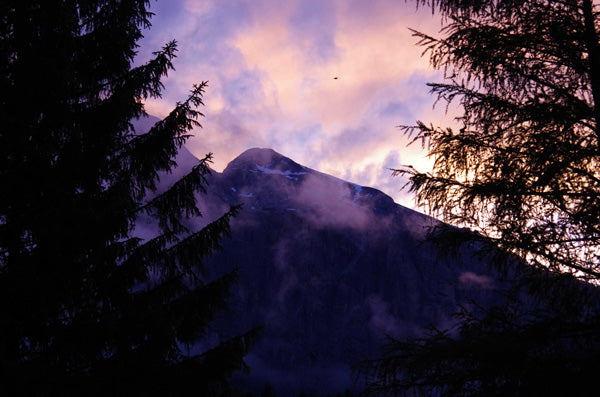Via Ferrata in the Italian Dolomites by Dan Aspel
- Adventurers
- Blog


High in the Cristallo Dolomites, approaching a summit accessible only to via ferratists.
Bored of winter yet? Then let’s imagine something sunnier. Because, while there are many ways to get your thrills in the outdoors, it’s hard to imagine one that tops via ferrata. For those unfamiliar with the term, it’s an Italian phrase that literally translates as “iron way”. Technically it’s a form of sport climbing, one in which you wear a harness and a simple set of leashes then clip yourself into a fixed route of pegs and stemples which wind around a mountainscape. You’re constantly connected to both those iron fittings as well as a fixed wire strung between them, so you don’t need any experience with gear or tools or any other climbing paraphernalia, and if you were to fall then the kit you’re wearing will do its best to hold you to the mountain whilst absorbing the impact as it does so.

Topping out on an extremely exposed route above the woodlands of Cortina d’Ampezzo.
In the greyest, dullest and darkest moments of this January I’ve found my mind wandering more and more to spring, summer and the possibilities of enjoying some more via ferrata, whether in its spiritual home of the Italian Dolomites or elsewhere in the European Alps. Once you’ve experienced it, it seems, the hobby can really get under your skin.
Ever since I first tried it four years ago I’ve been very passionate about it. And I’ve also wondered why that’s so. There are four main reasons I’ve come up with. They are…
It’s easy to learn, hard to master
The most basic VF routes are little more than protected walks in impressive locales. You may only need the most basic of scrambling experience to attempt them (or the ability to climb a ladder, in the most approachable examples). However, the highest end routes demand the ability to scramble and climb at a pretty advanced physical level - and far from everybody will be capable of completing them. There’s a lifetime of challenge here, and no reason not to begin it as a hobby.
It offers big thrills for little risk
Whereas many forms of climbing involve the acceptance of quite frighteningly high levels of risk, VF doesn’t. There is still danger here (from rockfall or lightning, for example), but broadly speaking this is a far safer prospect than traditional climbing where you place your own protection. So there’s less terror to dampen the fun.
Via Ferrata routes are always spectacular in their setting
Because who would want to tackle a VF route in a dull location? Some of the routes I’ve experienced in Italy, Slovenia and Germany have given access to the most spectacular mountainscapes imaginable. And there’s an intense rush to be gained from not just beholding the pinnacles and faces of a soaring range… but clinging onto and climbing around them too.
It’s economically viable
In almost all cases, VF routes are maintained by the relevant Alpine Club of the country in which they’re located. Consequently they’re free to use, whether you’re a member or not. It doesn’t get any better than that.
So… to further try and communicate this passion to you, below are 18 pictures taken during my most recent trip to the Dolomites. They’re focused around the bustling tourist town of Cortina d’Ampezzo, the Cristallo range and the routes which border the iconic Tre Cime di Lavaredo. You’ll find a little further detail and explanation in the captions.
Enjoy!

A typical Dolomites view, on top of the Cristallo range. Atop ridges it’s not always necessary to clip your kit to the fixed wire.



The most problematic sections of the most popular routes are often decorated with ladders and rungs.

A typical sight above 2,000m in the Dolomites - waymarkings tend to be far more comprehensive across the Alps than in the UK.

Via Ferrata partner Alex Berry, just hanging out.

Access to the higher sections of the Dolomites is made possible by a strong infrastructure of cable cars and ski lifts.

Many routes are named in honour of local guides and climbers.

The famous Tre Cime di Lavaredo - one of the “great north faces” of the Alps. No VF routes on here, but the peaks around teem with them.

The German term for via ferrata is often seen too.


The via ferrata leashes in action. There are two for safety’s sake, and to ensure a connection to the route even when transferring between sections of wire.

Walking out of the Tre Cime area.

Skiwasser - the perfect mountain refreshment cocktail of water, raspberry syrup and lemon juice. Available at the superb network of alpine huts that cover the Alps.

A dramatic sunset after a day spent clambering on rock.
Make sure to visit the Lifesystems Facebook page and Twitter feed to share your own experiences of via ferrata in the Dolomites, the Alps, the UK and across the rest of the world.
Until next time.
Dan

Dan Aspel is a journalist and Mountain Leader. You can find him at www.danaspel.com
Visit www.lifesystems.co.uk to find a host of kit and equipment for your next mountain adventure.



